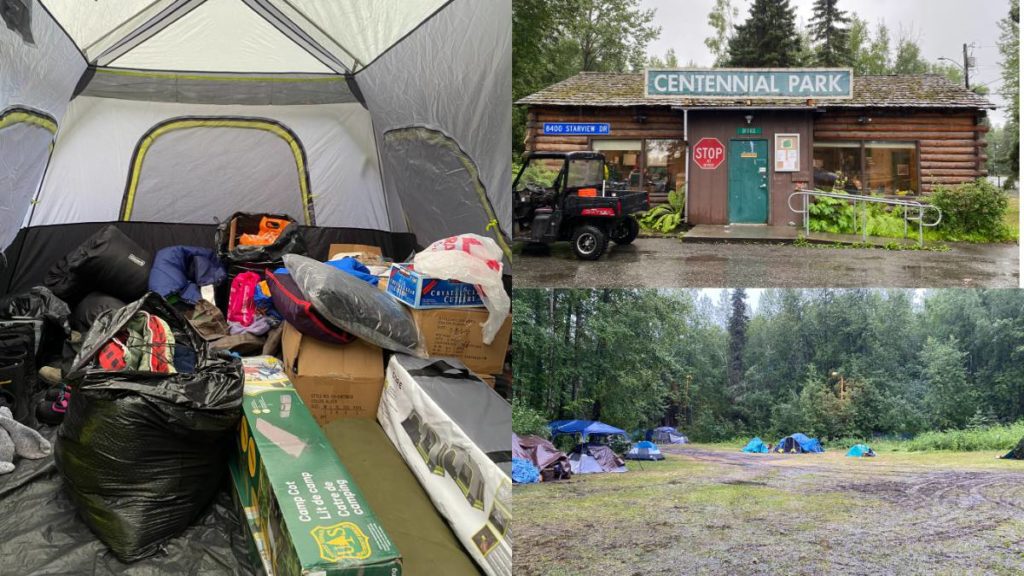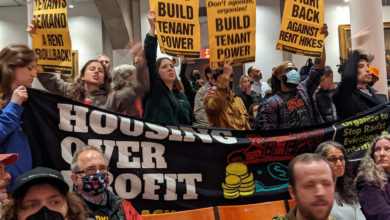On June 30 the Municipality of Anchorage shut down the Sullivan Arena homeless shelter due to a lack of federal funding. The Sullivan Arena, a reconverted hockey stadium and events venue had been used as a homeless shelter since March 2020, sheltered as many as 500 people, at times occupying the position of largest mass shelter in the U.S. What has occurred since June 30 can only be described as a humanitarian crisis.
Sullivan Arena’s closure took place with no plan to shelter its former inhabitants. Right-wing, Trump loyalist Mayor Dave Bronson’s administration recently ended a negotiation process with the predominantly liberal assembly that established the first coordinated response to homelessness in Anchorage history. The negotiation process, which, according to the administration, ended due to a breakdown in “transparency” and a lack of “accurate data and credible information,” produced the Mass Care Exit Strategy, a plan aiming to reduce homelessness in Anchorage to functional zero.
The Mass Care Exit Strategy created plans for three forms of shelter and housing in Anchorage: a complex care facility capable of sheltering 120 people, permanent and supportive housing at converted hotels around the city, and a 150-room “navigation center” connecting those experiencing homelessness to jobs, housing, and other resources. The navigation center, which has had its construction timeline pushed back multiple times, will be the largest low-barrier shelter in Anchorage upon its estimated completion in late January — three months after the typical first snowfall of Anchorage’s frigid winters. Until then, there remains no plan to shelter the growing mass of people at Centennial Campground — all other shelters in Anchorage are full with waiting lists and there are no large low-barrier shelters left.

Life at Centennial Campground: Theft, violence and bears
Of the people sheltered at the Sullivan Arena as the doors closed permanently to the city’s houseless population on June 30, some were able to secure spots in shelters, others moved to campsites across the city, and the remainder were bussed by the municipality to an unorganized site at Centennial Campground. As of July 20, there are anywhere between 250-300 individuals living there. Among them are families, children and people with mental and physical disabilities.
This repurposed campground is on the outskirts of the city, located on the side of the highway and far away from many essential services. The closest grocery store is two miles away, mail is often inaccessible as the nearest post office is six and a half miles away, and outside of the limited RV hookups, there is nowhere to charge devices leaving many people without the means to contact potential employers or resources to access housing even if they have phones. There are no rules but there are round-the-clock police responses that occur at least 4-5 times per day according to one camper.
Sexual assault, drug use, and violence are widespread at the camp. Theft at the campground has also been a massive issue. Many people would like to get jobs but are afraid of leaving their belongings unattended. Bears wander into the campground on a daily basis, posing a threat to campers as well as their food supply. The Alaska Department of Fish and Game has shot and killed five bears within the boundaries of the site and volunteers have been using bats and air horns to ward them off.
The humanitarian response in lieu of the municipality’s failure
The municipality designated the campground as a site for unsheltered people to relocate to, bused unsheltered people to the site, staffed the campground with Parks & Recreation employees and purchased thousands of dollars worth of bear bins to keep food safe. However, Bronson has said in a letter to Northeast Community Council president George Martinez, whose neighborhood includes Centennial Campground: “My administration continues to address a critical need in our community by waiving the camping fees for all campers at Centennial Campground. As members of my administration have communicated to the Community Council and you before, this is not a homeless camp.”
The neglect of large numbers of homeless people at Centennial Campground by the municipality has been monumental. Individual donors have kept the site supplied with extra tents, tarps, food, toiletries and other camping gear. The Salvation Army stepped in to manage client care at Centennial, and Bean’s Cafe, a local nonprofit, provides three hot meals a day— a large portion of which consist of food items donated by individuals. The Party for Socialism and Liberation, Anchorage is also organizing a tent and tarp drive to meet sheltering needs as people continue to file in.
Campers at Centennial want a humane plan
Randy, a well-respected individual amongst the houseless community at Centennial expressed the need to move toward an approach that humanizes those experiencing homelessness:“They are not respecting our rights, they are not treating us as human beings.” He added, “The people out here need to know that they’re worth something as an individual – each one of them.”
He added that in the municipality’s response to homelessness “there’s no direction…there’s no one that is in a position of being responsible to communicate anything to anyone.”
“The onus right now is for the campground to organize from within,” said Roger Branson, an individual activist who has been managing many of the camp’s day-to-day operations. “Otherwise we are on the verge of a breakdown of civility.”
His words served as an ominous warning as the next day Anchorage police arrived at the site and shot a camper. While both an officer and the camper were injured in a subsequent shootout, it remains unclear who fired first.
With support from the municipality, the Anchorage Police Department continues to criminalize homelessness and dehumanize homeless people. Meanwhile the capitalist treatment of housing as a commodity has created an unparalleled humanitarian crisis in Anchorage. It is clear that the system sponsoring these evils must be abolished. There is no solution to be found in a society where housing is not a human right. The people demand housing for all!





